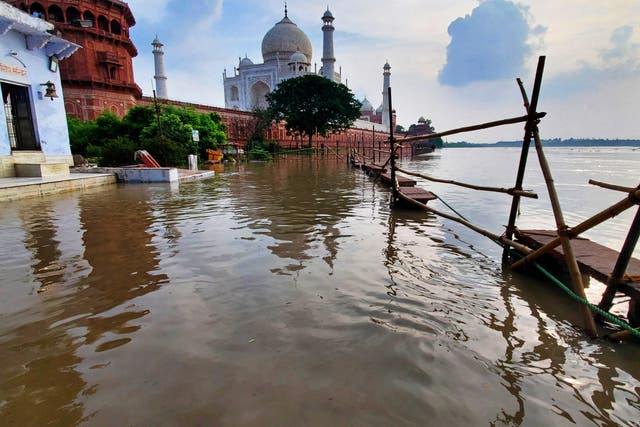Yamuna River: A Journey Through Time & Faith

Introduction to Yamuna River India
Overview of the Yamuna River
The Yamuna River, originating from Yamunotri Glacier in the Himalayas, flows through North India and merges with the Ganges River in Allahabad. As it cascades down the mountains, the river meanders through states like Uttarakhand, Delhi, Haryana, and Uttar Pradesh. The crystal-clear waters of the Yamuna hold unique significance in the region's ecosystem, supporting diverse plant and animal life along its banks.
Importance of the Yamuna River for India
You are fortunate to witness the beauty and magnificence of the Yamuna River, a lifeline for millions of people across India. Its waters not only sustain agriculture along its basin but also provide drinking water to countless communities.
As you marvel at the Yamuna, remember that it plays a crucial role in India's cultural and religious landscape, with numerous sacred sites dotting its shores. The future of the river looks promising as efforts are being made to clean and rejuvenate it, ensuring a vibrant ecosystem for generations to come.

Origin and Course of the Yamuna River
Source of the Yamuna River
You can envision the breathtaking journey of the Yamuna River, commencing its flow from the pristine Yamunotri Glacier nestled in the majestic Himalayas. As the glacier melts, it gives birth to the crystal-clear waters that define the Yamuna.
Imagine standing at the very source, where the river emerges as a symbol of purity and vitality, ready to embark on its remarkable voyage.
Flow and tributaries of the Yamuna River
You can follow the Yamuna's path as it weaves its way through the heart of North India, meandering through picturesque states like Uttarakhand, Delhi, Haryana, and Uttar Pradesh. Picture the river gracefully joining hands with its tributaries, receiving their contributions to enhance its strength and depth.
As you observe this harmonious union, recognize the collective effort that shapes the Yamuna's identity, enriching the lands it blesses with its flow.

Historical Significance of the Yamuna River
Historical events and civilizations along the Yamuna River
Explore the rich history that has unfolded along the banks of the Yamuna River, from ancient civilizations to pivotal moments in time. Feel the echoes of the past reverberating through the stories of empires and cultures that flourished in the river's embrace.
Cultural importance of the Yamuna River
Delve into the cultural tapestry woven by the Yamuna River, influencing art, music, and spiritual practices for centuries. Embrace the heritage that flows with the waters of the Yamuna, connecting communities and traditions in a vibrant celebration of life.

Environmental Concerns and Pollution of the Yamuna River
Pollution sources affecting the Yamuna River
As you contemplate the current state of the Yamuna River, recognize the multiple sources of pollution that threaten its pristine waters. Witness the effects of industrial discharge, agricultural runoff, and urban waste as they converge to challenge the river's purity.
Imagine the journey of contaminants seeping into the very essence of the Yamuna, disrupting the delicate balance of its ecosystem.
Impact of pollution on the ecosystem and communities along the Yamuna River
Visualize the repercussions of this pollution on the diverse ecosystem that depends on the Yamuna for sustenance. Picture the struggles of aquatic life, flora, and fauna as they navigate through contaminated waters, facing a daunting threat to their existence.
Consider the communities along the riverbanks, whose livelihoods and well-being are intricately linked to the health of the Yamuna. Embrace the potential for change, envisioning a future where collective efforts restore the Yamuna to its former glory.

Efforts for Yamuna River Conservation
Government initiatives for Yamuna River clean-up
Reflect on the steps taken by government bodies to mitigate the pollution affecting the Yamuna River. Recognize the implementation of stringent regulations on industrial effluents and sewage discharge, aiming to reduce the contaminants that infiltrate the river.
Appreciate the investment in wastewater treatment plants and pollution monitoring systems to track and control pollution levels effectively. Believe in the potential of these initiatives to revive the Yamuna's ecosystem and safeguard its waters for future generations.
Community-led conservation efforts
Embrace the power of grassroots movements and community initiatives in preserving the Yamuna River. Witness the commitment of local volunteers and environmental groups in organizing clean-up drives, planting trees along the riverbanks, and raising awareness about sustainable practices.
Join hands with like-minded individuals who strive to protect the Yamuna's ecosystem and advocate for its conservation. Envision a future where collective action and community engagement lead to significant improvements in the health of the Yamuna River.
.jpg)
Economic Importance of the Yamuna River
Role of the Yamuna River in agriculture and irrigation
Consider the significance of the Yamuna River in supporting agricultural practices and irrigation systems in the surrounding regions. Acknowledge the role this river plays in providing water for crops, promoting agricultural growth, and sustaining the livelihoods of farmers dependent on its waters. Recognize the value of harnessing the river's water resources efficiently to ensure a robust agricultural economy.
Potential for tourism and recreational activities along the Yamuna River
Explore the vast potential that the Yamuna River holds for tourism and recreational activities. Imagine the possibilities of boating excursions, bird-watching tours, and cultural experiences along its banks, attracting visitors and boosting local economies.
Visualize the development of eco-tourism initiatives that showcase the river's biodiversity and cultural heritage, creating sustainable opportunities for economic growth and community development.

Challenges and Future of the Yamuna River
Current challenges facing the Yamuna River
You should be aware of the current challenges that the Yamuna River is facing. Recognize the need to address issues such as pollution, industrial waste, and inadequate wastewater treatment that threaten the river's ecosystem and water quality.
Consider the impact of urbanization and deforestation on the river's flow and biodiversity. Acknowledge the urgency of implementing effective measures to protect and restore the Yamuna River for future generations.
Future outlook and sustainability measures for the Yamuna River
Imagine a future where the Yamuna River thrives as a clean and vibrant water source. Envision collaborative efforts between government, communities, and organizations to implement sustainable practices and policies that safeguard the river's health and integrity.
Embrace innovative solutions such as wastewater treatment plants, afforestation projects, and pollution control measures to ensure long-term sustainability. Believe in the potential of restoring the Yamuna River to its former glory, enhancing ecosystems, supporting biodiversity, and providing clean water for all.
